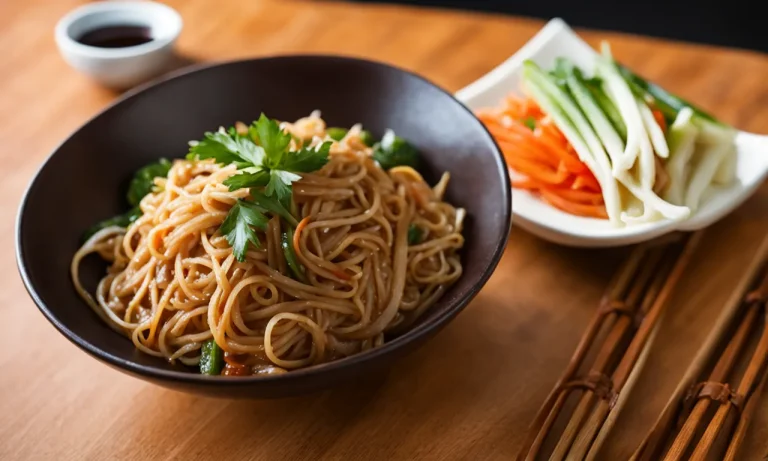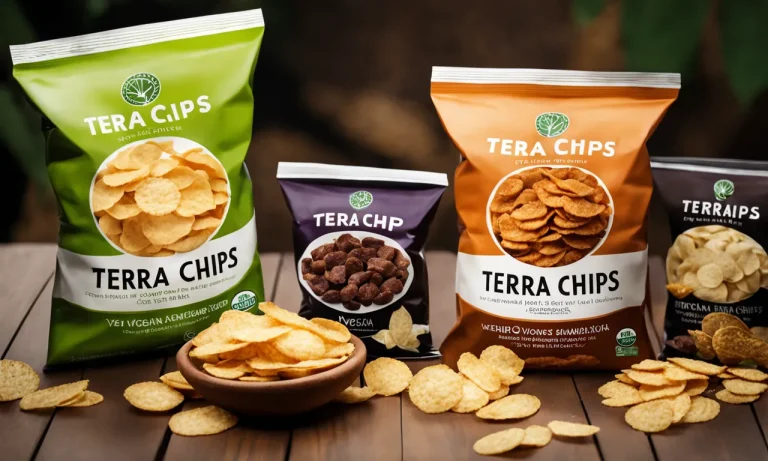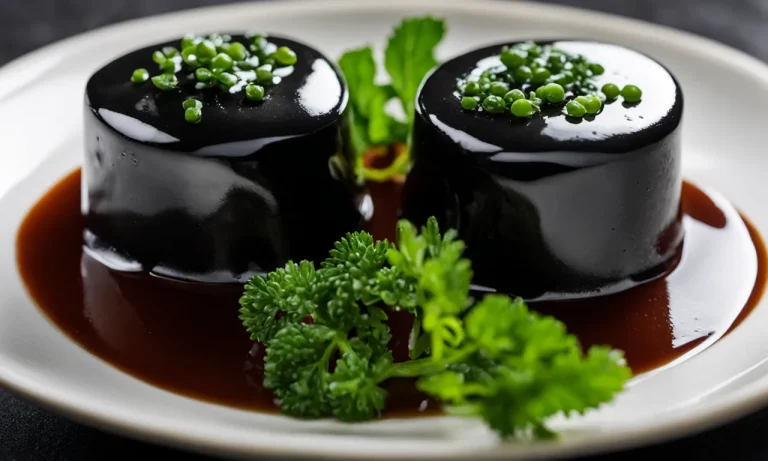Is Nongshim Ramen Vegan? A Detailed Look
Ramen noodles are a popular convenience food enjoyed by many around the world. With its savory broth, chewy noodles, and assortment of toppings, it’s no wonder why ramen has become a staple meal for people on the go. But can vegans enjoy ramen too? Specifically, is Nongshim ramen vegan?
Let’s take a closer look.
If you’re short on time, here’s a quick answer to your question: Most Nongshim ramen varieties are not vegan due to containing animal products like pork or beef in the flavoring. However, Nongshim does offer some vegan ramen options, like their Soon Veggie Noodle Soup.
In this nearly 3000 word article, we’ll provide a detailed analysis on the vegan status of Nongshim ramen. We’ll look at the ingredient lists of popular Nongshim ramen products, explain which animal-derived ingredients to watch out for, and highlight the vegan Nongshim ramen options currently available.
Background on Nongshim and Ramen
Overview of Nongshim as a company: Nongshim is a South Korean food company that specializes in producing instant noodles, including their popular ramen products. Founded in 1965, Nongshim has become one of the leading instant noodle brands worldwide, known for their high-quality and flavorful products.
They have a wide range of ramen flavors, catering to various taste preferences.
Brief history of ramen: Ramen, a popular Japanese dish, has a fascinating history that dates back to the early 20th century. It was originally introduced in Japan by Chinese immigrants, and over the years, it has evolved into a beloved staple in Japanese cuisine.
Ramen consists of wheat noodles served in a flavorful broth, often accompanied by various toppings such as sliced pork, seaweed, and green onions. This versatile dish has gained immense popularity globally, with different countries putting their own unique twist on it.
Ramen ingredients and how they’re made: Ramen noodles are typically made from wheat flour, water, and salt. The dough is kneaded, rolled out, and then cut into thin noodles. The noodles are then typically steamed or boiled before being added to the broth.
The broth itself is a key component of ramen and is made by simmering ingredients like bones, meat, vegetables, and spices for several hours to extract maximum flavor. The combination of the noodles and the broth creates the delicious and comforting bowl of ramen that we all love.
Analyzing the Vegan Status of Popular Nongshim Ramen Products
If you’re a vegan or someone who follows a plant-based diet, finding suitable food options can sometimes be a challenge. Many people wonder whether Nongshim Ramen, a popular brand known for its delicious instant noodles, is vegan-friendly.
In this article, we will take a detailed look at the vegan status of some of Nongshim’s most popular ramen products.
1. Shin Ramyun
Shin Ramyun is one of Nongshim’s most well-known ramen varieties. Unfortunately, it is not considered vegan-friendly. The flavor packets of Shin Ramyun contain animal-based ingredients such as beef extract and dried fish.
Therefore, if you are following a vegan or vegetarian lifestyle, it’s best to steer clear of this particular ramen flavor.
2. Ansung Tangmyeon
Ansung Tangmyeon is another popular Nongshim ramen product. Good news for vegans – this flavor is considered vegan-friendly! The ingredients do not contain any animal-based products, making it a great option for those following a plant-based diet.
However, always double-check the ingredient list on the packaging, as formulations may vary.
3. Kimchi Ramen
Kimchi Ramen is a flavorful and spicy ramen variety from Nongshim. Unfortunately, it is not suitable for vegans. The seasoning packets of Kimchi Ramen contain ingredients derived from animal sources, including dried shrimp and anchovy extract.
Vegans should opt for other ramen flavors that do not contain animal-based ingredients.
4. Neoguri Ramen
Neoguri Ramen is a popular choice for those who enjoy a seafood-flavored ramen. However, similar to Shin Ramyun and Kimchi Ramen, Neoguri Ramen is not vegan-friendly. The seasoning packets of Neoguri Ramen contain fish and shellfish extracts, making it unsuitable for vegans and vegetarians.
5. Chapagetti Ramen
Chapagetti Ramen is a unique fusion of Chinese-style and Korean-style noodles. Unfortunately, this flavor is not vegan-friendly. The seasoning packets of Chapagetti Ramen contain ingredients derived from animal sources, including beef extract.
Vegans should choose other ramen flavors that do not contain animal-based ingredients.
While some of Nongshim’s ramen flavors are not suitable for vegans, they do offer other vegan-friendly options such as Veggie Ramyun and Soon Veggie Ramyun. It’s always important to read the ingredient list carefully and choose the flavors that align with your dietary preferences.
Remember, if you have any specific dietary concerns or restrictions, it’s best to consult with a healthcare professional or registered dietitian to ensure you’re meeting your nutritional needs.
Animal-Derived Ingredients to Look Out for in Ramen
When it comes to determining whether Nongshim Ramen is vegan-friendly, it’s important to understand the different animal-derived ingredients that may be present in the product. Here are some key components to look out for:
Meat (pork, beef, chicken, fish)
Traditionally, ramen is known for its flavorful meat-based broths. However, for those following a vegan lifestyle, it’s crucial to avoid ramen that contains any meat products. This includes pork, beef, chicken, or fish.
It’s always a good idea to carefully check the ingredient list or packaging to ensure that the ramen is free from any animal-derived meats.
Broths and flavorings
Broths and flavorings play a significant role in the taste of ramen. Unfortunately, many broths are made using animal-based ingredients such as bones, marrow, or gelatin. These ingredients provide a rich and savory taste, but they are not suitable for vegans.
If you’re looking for vegan ramen options, be sure to choose products that clearly state that their broths and flavorings are plant-based or vegetable-derived.
Noodles
The noodles used in ramen can also be a source of concern for vegans. Some traditional ramen noodles are made using eggs, which are an animal-derived ingredient. However, there are vegan-friendly alternatives available, such as noodles made from rice, buckwheat, or other grains.
Look for ramen noodles that explicitly state that they are egg-free or vegan-friendly.
Toppings
Lastly, it’s important to consider the toppings that are commonly added to ramen. Some popular toppings, like sliced pork, fish cakes, or bonito flakes, are not suitable for vegans. However, there are plenty of delicious vegan toppings that can be added to enhance the flavor and texture of your ramen.
Consider options like tofu, mushrooms, seaweed, green onions, or bean sprouts to create a satisfying and plant-based ramen experience.
Remember, always read the ingredient list or packaging carefully to ensure that the ramen you choose is vegan-friendly. If you’re unsure, you can also reach out to the manufacturer or check their official website for more information. Happy vegan ramen hunting!
Vegan Nongshim Ramen Options
Soon Veggie Noodle Soup
One of the vegan options available from Nongshim is the Soon Veggie Noodle Soup. This delicious instant ramen is made with vegan-friendly ingredients, such as dried vegetables and vegetable broth. It does not contain any meat or animal products, making it a great choice for vegans or those looking to incorporate more plant-based meals into their diet.
The Soon Veggie Noodle Soup is not only vegan-friendly, but it is also packed with flavor. The combination of the savory vegetable broth and the chewy noodles creates a satisfying and delicious meal. Whether you’re a vegan or simply looking for a tasty and convenient meal option, the Soon Veggie Noodle Soup is a great choice.
Potato Ramen
Another vegan option from Nongshim is the Potato Ramen. This unique flavor is a favorite among vegans and non-vegans alike. The potato-based broth adds a creamy and comforting element to the ramen, while the noodles provide a satisfying texture.
The Potato Ramen is a great option for those looking to switch up their usual ramen routine. It offers a different taste profile compared to traditional ramen flavors, making it a refreshing and delicious choice.
Other Vegan-Friendly Tips
If you’re looking for more vegan options from Nongshim, there are a few other flavors that are also vegan-friendly. Some of these include the Shin Ramyun Black and the Kimchi Ramyun. However, it’s always important to double-check the ingredients list, as formulations may vary.
When purchasing Nongshim ramen, make sure to look for the “vegan” label on the packaging. This will ensure that the product is free from any animal products or by-products.
If you’re unsure about the vegan status of a particular Nongshim ramen flavor, you can always refer to their official website for more information. They provide detailed product descriptions and ingredient lists, making it easier to make an informed decision.
The Future of Vegan Ramen
Veganism has been gaining popularity worldwide, and it is not surprising that the demand for plant-based foods, including vegan ramen, is on the rise. People are becoming more conscious about their health, the environment, and animal welfare, leading to an increasing number of individuals adopting a vegan lifestyle.
This shift in consumer preferences has prompted food companies to innovate and cater to the growing demand for vegan products.
Increasing demand for plant-based foods
The demand for plant-based foods has seen a remarkable surge in recent years. According to a report by Grand View Research, the global vegan food market is expected to reach $31.4 billion by 2026, with a compound annual growth rate (CAGR) of 11.9%.
This growth can be attributed to various factors, such as concerns about animal welfare, environmental impact, and health benefits.
With an increasing number of people adopting veganism, the demand for vegan ramen has also seen a significant rise. Ramen, a popular Japanese dish, traditionally contains animal-based ingredients like meat or fish broth.
However, the demand for vegan alternatives has led to the development of plant-based ramen options.
Efforts by Nongshim and other brands
Nongshim, a well-known Korean food company, has recognized the growing demand for vegan options and has taken steps to cater to this market. They have introduced vegan-friendly versions of their popular ramen products, providing a delicious and cruelty-free alternative for ramen lovers.
Other brands in the market have also started offering vegan ramen options to meet the increasing demand. These brands are focusing on creating flavorful broth substitutes using plant-based ingredients like mushrooms, seaweed, and vegetable seasonings.
They are also experimenting with different types of noodles, such as rice noodles or noodles made from alternative grains, to provide a wider range of options for consumers.
Furthermore, these brands are not only focusing on taste but also on the nutritional profile of their vegan ramen. They are incorporating ingredients that are rich in protein, vitamins, and minerals to ensure that consumers get a wholesome and satisfying meal.
Predictions and outlook
The future of vegan ramen looks promising. With the increasing demand for plant-based foods, it is likely that more food companies will enter the market and offer vegan ramen options. This competition will drive innovation and result in even more delicious and diverse vegan ramen choices.
Additionally, as consumers become more conscious of their health and the environment, the demand for vegan ramen will continue to grow. People are actively seeking out healthier and more sustainable food options, and vegan ramen fits the bill perfectly.
Conclusion
To conclude, while the majority of Nongshim’s ramen products contain animal ingredients and are not vegan, the brand does offer some vegan ramen choices. As plant-based diets continue to grow in popularity, we may see more vegan ramen options emerge from brands like Nongshim.
But for now, diligently reading ingredient labels remains key for vegans seeking out animal-free ramen that aligns with their diet and lifestyle.







